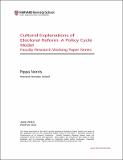| dc.contributor.author | Norris, Pippa | |
| dc.date.accessioned | 2010-09-22T14:27:33Z | |
| dc.date.issued | 2010 | |
| dc.identifier.citation | Norris, Pippa. 2010. Cultural Explanations of Electoral Reform: A Policy Cycle Model. Faculty Research Working Paper Series, RWP10-022, John F. Kennedy School of Government, Harvard University. | en_US |
| dc.identifier.uri | http://nrs.harvard.edu/urn-3:HUL.InstRepos:4449095 | |
| dc.description.abstract | The standard explanation of electoral reform is offered by rational choice accounts. These regard the choice of rules as an elite-level issue, dominated by partisan interests bargaining within the legislature, where citizens are usually marginalized and powerless. Such accounts may help to explain what specific reforms are enacted but they lack the capacity to account satisfactorily for the logically prior questions: when and why are any successful reforms raised on the policy agenda? Part I presents a general policy cycle model identifying multiple actors in the process of electoral change. Working within this framework, the study seeks to test the proposition that political culture -- notably citizen dissatisfaction with regime legitimacy -- heightens the salience of institutional reform on the policy agenda. Part II summarizes the research design testing this proposition. Perceptions of regime legitimacy are measured at three levels: citizens’ aspirations for democracy, satisfaction with the performance of democracy, and confidence in regime institutions. Evidence draws upon the 2nd and 3rd waves of the World Values Survey (WVS), in the early to mid-1990s, covering almost fifty countries around the globe. Patterns of institutional reform are measured by major changes to the electoral systems used for the lower house of parliament during the following decade. The study uses binary logistic regression to test whether macro-level perceptions of regime legitimacy in the early to mid-1990s influenced whether electoral reforms were passed during the subsequent decade, controlling for levels of democracy and development. Part III presents the results. The evidence demonstrates that democratic aspirations (support for democracy as an ideal) are a strong, significant, and robust predictor of the occurrence of subsequent electoral reforms. The conclusion in Part IV considers the implications of these findings, both for theories concerning regime legitimacy, as well as for revising standard accounts of processes of institutional change. | en_US |
| dc.language.iso | en_US | en_US |
| dc.publisher | John F. Kennedy School of Government, Harvard University | en_US |
| dc.relation.isversionof | http://web.hks.harvard.edu/publications/workingpapers/citation.aspx?PubId=7338 | en_US |
| dash.license | LAA | |
| dc.title | Cultural Explanations of Electoral Reform: A Policy Cycle Model | en_US |
| dc.type | Research Paper or Report | en_US |
| dc.description.version | Author's Original | en_US |
| dc.relation.journal | HKS Faculty Research Working Paper Series | en_US |
| dash.depositing.author | Norris, Pippa | |
| dc.date.available | 2010-09-22T14:27:33Z | |
| dc.identifier.doi | 10.2139/ssrn.1624866 | |
| dash.contributor.affiliated | Norris, Pippa | |


